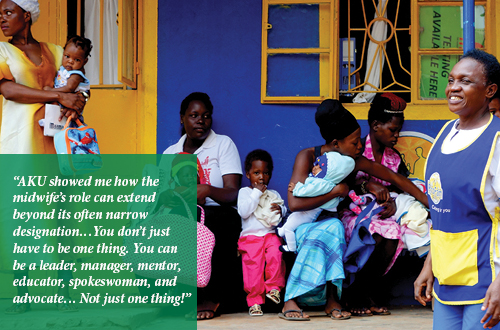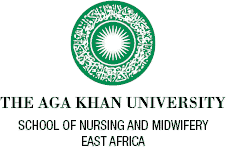Maama Maria
 Mary Musoke has been a health professional most of her life. She is popularly known as “Maama Maria,” a nickname coined by colleagues. Before opening Maama Maria’s Domiciliary Clinic, she served as a nurse and midwife in a public hospital in Mulago and in a one-room clinic she had opened in her community.
Mary Musoke has been a health professional most of her life. She is popularly known as “Maama Maria,” a nickname coined by colleagues. Before opening Maama Maria’s Domiciliary Clinic, she served as a nurse and midwife in a public hospital in Mulago and in a one-room clinic she had opened in her community.
Although she enjoyed her work at Mulago, Mary realized at some point that, “women in the community needed me more,” because the average Ugandan woman found the charges, overcrowding and distance to public hospitals daunting. She was also aware that distrust and cultural expectations were other reasons why women shied away from public hospitals.
Mary recalls how expectant mothers used to go to her home for advice and to be examined. When a mother delivered in her living room on one of these visits, Mary decided to resign from Mulago Hospital to start a private clinic in the heart of her community.
In 2006, she enrolled in the BScN programme at AKU, a move she describes as transformative and empowering, as it gave her, among other things, the confidence to move her clinic from a single room to the large facility that she works in and heads today. Her work at the clinic played a major role in her being appointed president of the Private Midwives Association of Uganda (PWAU), which has representatives from most of the 111 districts in the country.
The bright blue and yellow of Maama Maria’s Domiciliary Clinic – a stark contrast to the dull, earthen hues of the other neighboring buildings – are the colours of the only private clinic in Kagoma that specializes in maternal care. The clinic has four beds for post-delivery admission and one delivery bed. The health centre has three midwives, a lab technician, a clinical officer and a part-time radiologist, and also functions as an immunization, educational and adolescent health space. The clinic also offers syphilis, malaria and cancer screening services, as well as post-abortion care for a population that is often marginalized by other institutions.
The main purpose of the clinic, according to Mary, is to educate those who seek their services, and to fill the gap between the services provided by traditional birthing assistants (in rural settings) and those offered by public hospitals.
At Maama Maria’s Domiciliary Clinic, she has introduced a documentation system, an infection control programme, and new birthing strategies that ease the delivery process.
Mary has faced many challenges on her journey: raising a family, joining AKU when she was older than the typical student, getting funds to finance her various goals and educational pursuits and leaving a secure job to pursue a passion. Lack of funds was the biggest challenge for Mary when she started out, especially after her loan applications were rejected. In her current role, finding qualified human resources remains a problem, and she needs a permanent radiographer. Also, power outages are frequent and her generator is unreliable.
Mary offers her staff continuous professional development opportunities, but states she would prefer to have more well-trained individuals. She reveals that while most of the challenges are getting resolved, the pace is slow. Fundraising contributed funds for continuous education and the growth of the clinic, which has prompted the hiring of new staff and the acquisition of more equipment. Her next goal is to expand the clinic further so she can serve more people in her community.
As president of the PWAU, Mary is the spokeswoman, guide to new areas of growth, overseer, chief planner, proposal writer and chief lobbyist for support from the government. PWAU a 780-member organization, holds monthly meetings that focus on the continuous professional development of members. Agendas are set based on current issues such as effective infection control.
Her biggest challenge when she was appointed PWAU leader was lack of knowledge about the advocacy process. But now she feels comfortable advocating at high levels – in the Ministry of Health and in parliament.
Mary has focused on advocating for midwives and on empowering individual members of PWAU by encouraging them to take on more responsibilities. Mary has also directed her efforts at enhancing the quality of continuous professional development in the organization, which includes a leadership mentoring programme in which past presidents will work with new presidents to transfer valuable knowledge. She has also reworked the entire electoral process by introducing a feedback system that has so far increased transparency in the organization. Her most recent achievement has been successfully lobbying for a large chunk of land – the site of a planned mentorship and model training institution.
Mary explains that the thinking behind establishing a mentorship and model training institute is that new midwives often do not receive the assistance they need to successfully perform their duties after graduation. The training school will therefore focus on mentoring students and giving them on-the-job training so they can understand what is expected of them after their studies.
At AKU, Mary gained writing, leadership, documentation and administration skills. “The expertise I received at AKU has helped me stand out as a leader in the community and in my clinic and as president of PWAU,” she says. Mary believes she was appointed to the presidential position at PWAU based on the skills she acquired at AKU, and she adds that the superior education she received distinguishes her in her field. She says she has transferred with ease the competencies she acquired at AKU to her practice and management positions and that the skills also helped her implement many new techniques, strategies and programmes at her clinic.
So far, Mary has encouraged 13 nurses to enrol at AKU and has invited alumni to speak to midwives at PWAU. Such is her confidence in the training offered at her alma mater.


